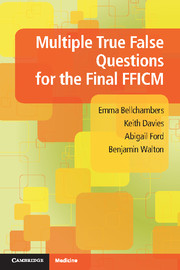Introduction
Published online by Cambridge University Press: 05 January 2015
Summary
In the United Kingdom, successful completion of the examinations for both the Primary and Final Fellowship of the Faculty of Intensive Care Medicine (FFICM) is now an integral part of the assessment for a Certificate of Completion of Training (CCT) in Intensive Care Medicine (ICM). Currently, a pass in the Primary examination of one of the relevant UK medical colleges – MRCP (UK), MCEM or FRCA Primary - allows candidates to sit the Final FFICM exam. Discussions are under way on the introduction of a FFICM Primary examination in its own right.
The Final FFICM exam comprises three sections: a multiple choice question examination (MCQ), an objective structured oral examination (OSCE) and a structured oral examination (SOE). From July 2014, the MCQ part of the exam has consisted of 90 questions, 60 of the multiple true false (MTF) type and 30 of the single best answer (SBA) type. While this book will be useful for all three components of the exam, it is best placed as a revision aid for the MTF part of theMCQ exam. The three 90-question papers contained in the book have been designed to encompass the 13 sections that make up the current syllabus for a CCT in ICM. This syllabus is broadly similar to the CoBaTrICE syllabus developed under the auspices of the European Society of Intensive Care Medicine, so the questions will be of direct relevance to those candidates undertaking this exam as well.
- Type
- Chapter
- Information
- Publisher: Cambridge University PressPrint publication year: 2014



